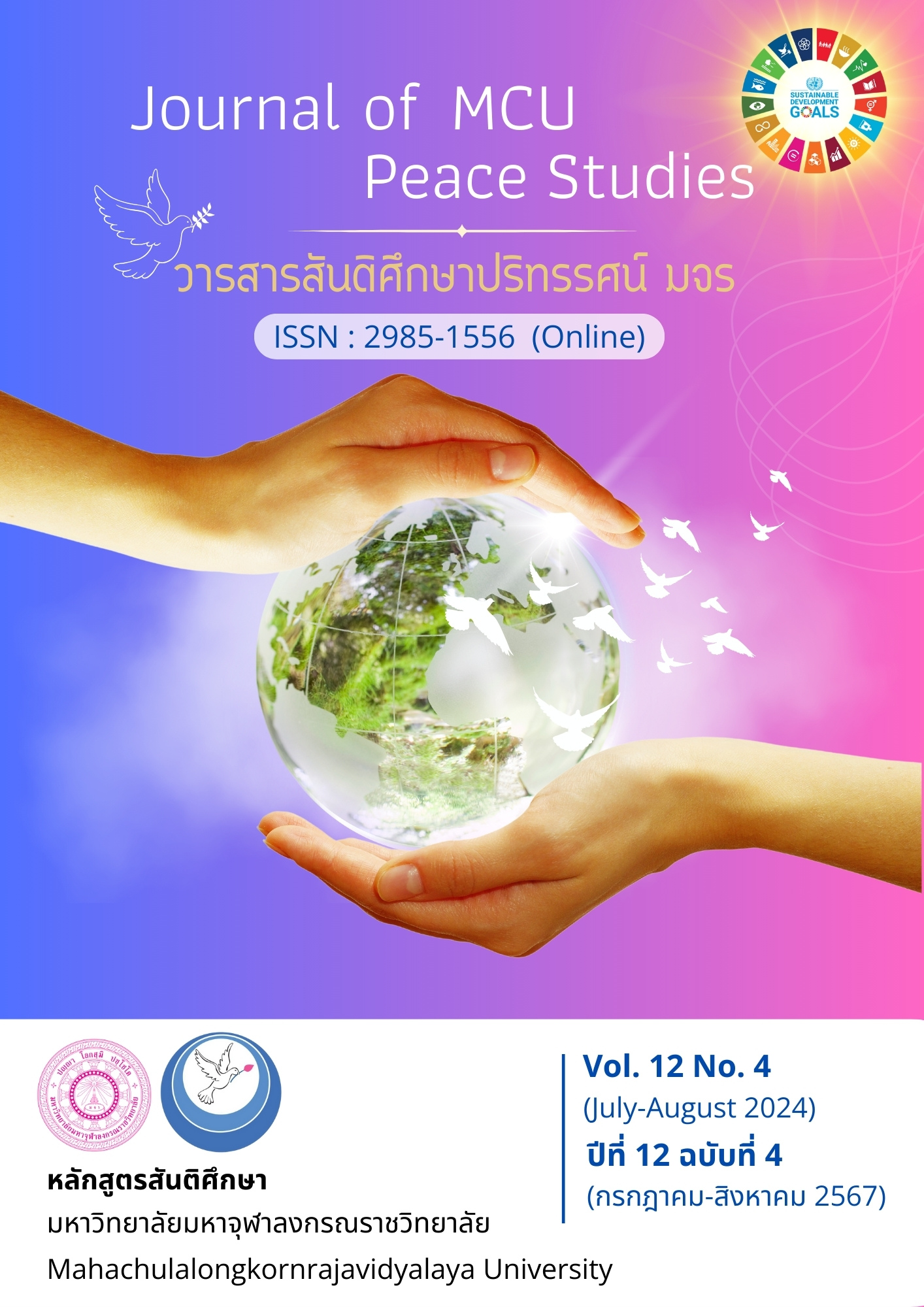The Political Attitudes and Behavior of the Gender Gap: Evidence from Upper Northern Thailand
Main Article Content
บทคัดย่อ
This research investigates gender disparities in political attitudes and behaviors among eligible voters in northern Thailand's Lamphun, Phrae, and Uttaradit provinces, encompassing a population of 2,804,978 identified through the Election Commission's database. Using Taro Yamane's formula, a sample of 400 participants was determined. Employing Multi-Stage Sampling, the methodology includes Cluster Random Sampling and multi-stage cluster sampling for equitable representation. Questionnaires were used for data collection, and analysis involved descriptive statistics, including frequency and percentage, and inferential statistics, specifically the Chi-square test.
The study examines male and female political engagement across various contexts, finding no statistically significant gender differences. Shared interests in politics, concerns about social injustice, and corruption transcend gender, influenced by cultural experiences, economic factors, and education levels. Consequently, both genders have equal opportunities to contribute to the political discourse. Future research should delve into policy implications, generational shifts, and utilize mixed-methods approaches to better understand the complex interactions between gender and political beliefs and behaviors. These findings can inform policy development in Thailand's upper north, promoting gender equality, political engagement, and inclusive decision-making.
Article Details

อนุญาตภายใต้เงื่อนไข Creative Commons Attribution-NonCommercial-NoDerivatives 4.0 International License.
ทัศนะและความคิดเห็นที่ปรากฏในบทความในวารสาร ถือเป็นความรับผิดชอบของผู้เขียนบทความนั้น และไม่ถือเป็นทัศนะและความรับผิดชอบของกองบรรณาธิการ ยินยอมว่าบทความเป็นลิขสิทธิ์ของวารสาร
เอกสารอ้างอิง
Butler, J. (1990). Gender Trouble: Feminism and the Subversion of Identity. UK: Routledge.
Chattopadhyay, R., & Duflo, E. (2004). Women as Policy Makers: Evidence from a Randomized Policy Experiment in India. Econometrica, 72(5), 1409-1443.
Choo, W. Y., Kong, L. Y., & Azmi, F. (2016). Women's Political Participation in Malaysia: Challenges and Prospects. Journal of Social and Political Sciences, 1(1), 48-61.
Connell, R. W. (2002). Gender. Cambridge, UK: Malden, MA.
Crenshaw, K. (1989). Demarginalizing the Intersection of Race and Sex: A Black Feminist Critique of Antidiscrimination Doctrine, Feminist Theory, and Antiracist Politics. University of Chicago Legal Forum, 1989(1), 139-167.
Delli Carpini, M. X., & Keeter, S. (1997). What Americans Know about Politics and Why It Matters. New Haven, CT: Yale University Press.
Easton, D. (1965). A Systems Analysis of Political Life. New York: John Wiley & Sons.
Inglehart, R., & Norris, P. (2000). The Developmental Theory of the Gender Gap: Women's and Men's Voting Behavior in Global Perspective. International Political Science Review, 21(4), 441-463.
Lawless, J. L., & Fox, R. L. (2010). It Still Takes a Candidate: Why Women Don't Run for Office. Cambridge: Cambridge University Press.
Lee, S. M., & Kim, Y. J. (2014). Exploring the Relationship between the Use of New Media and Political Participation among Young Korean Citizens. International Journal of Communication, 8, 24.
Mietzner, M., & Muhtadi, B. (2019). Political Participation in Indonesia: Striving for Inclusive Democracy. Cambridge: Cambridge University Press.
Norris, P., Inglehart, R., & Welzel, C. (2013). Gender Equality and Social Welfare in East and Southeast Asia. Hong Kong: University of Hong Kong.
O'Brien, D. J., & Krauss, E. S. (2012). Women's Representation and Democracy in Japan: The Role of the State in Promoting Women's Public Roles. United Kingdom: Oxford University Press.
Paitoonpong, S., & Phongpaichit, P. (2018). Gender and Democratization in Thailand: Women's Role in Political Change. In Gender and Democratization in Southeast Asia (pp. 201-222). Springer.
Phongpaichit, P., & Baker, C. (1998). Thailand: Economy and Politics. United Kingdom: Oxford University Press.
Pimdee, P., & Chantavanich, S. (2007). Women and Poverty Reduction in Thailand: Meeting the Needs of Women in the Northern Region. Women’s Studies International Forum, 30(1), 79-88.
Putnam, R. D. (2000). Bowling Alone: The Collapse and Revival of American Community. Conference: Proceedings of the 2000 ACM Conference on Computer Supported Cooperative Work (p. 171). Simon and Schuster.
Somboonkulavudi, W. (2019). Education Policies and Local Education Practices in Northern Thailand: A Study of the Education of the Karen People. Asian Ethnicity, 20(1), 96-112.
Somchai, P., Thaichon, P., & Saengwichit, K. (2019). Gender Differences in Political Knowledge and Political Participation in Thailand. Kasetsart Journal of Social Sciences, 40(3), 597-605.
Thongchai, W. (2017). Political Attitudes in Thailand: Democracy, Reform, and the Role of the Monarchy. Singapore: ISEAS-Yusof Ishak Institute.
West, C., & Zimmerman, D. H. (1987). Doing Gender. Gender & Society, 1(2), 125-151.


